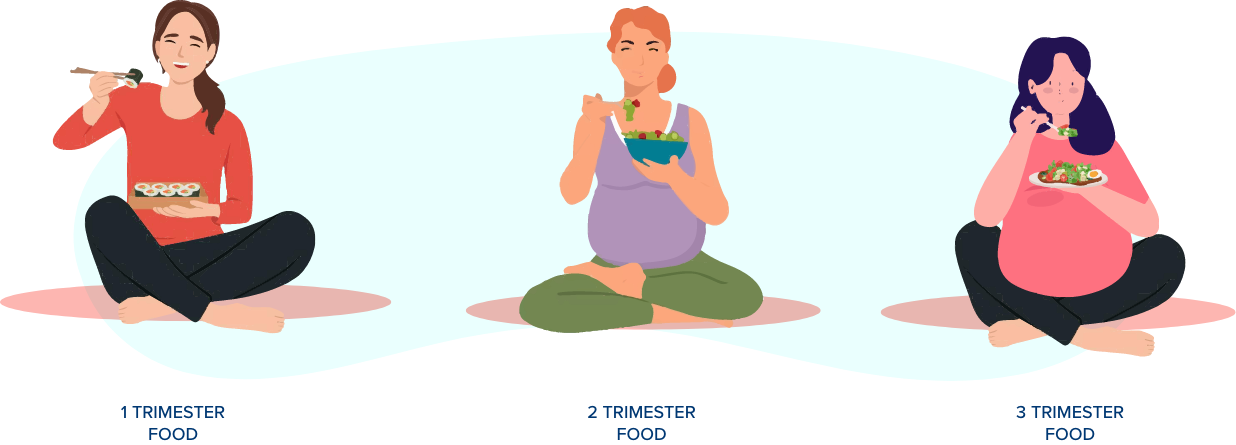





No lab centers are available in this city
The First Trimester of Pregnancy: What to Expect
Fuelling the body with a nutritious diet is always important; it is even more crucial to maintain a well-balanced diet in the 1st trimester of pregnancy. A good and well-balanced diet during pregnancy can help the mother handle the extra demands on their body as the pregnancy progresses. To maintain a healthy pregnancy, approximately 300 extra calories and varying nutrients like iron, folate, and iodine are required by the body to support the growth of the foetus and maintain the right weight. These calories can come from a balanced diet of fibre-rich fruits, vegetables, whole grains, etc.


Nutritional Needs for the First Trimester
During the first month of pregnancy, the food chart should include nutrient-packed food that is required to help the mother maintain her health and to support foetal development. Some of the foods to eat in the first trimester of pregnancy include:
Folic Acid
Folic acid, also known as folate, is a B-group vitamin that should be a part of the food chart for the first trimester or during the first 28 days after conception when it is most likely for neural tube defects to occur. A daily intake of approximately 500 micrograms in the first trimester diet is generally prescribed by healthcare professionals. Some excellent food sources of folic acid include asparagus, bran flakes, chickpeas, broccoli, lentils, spinach, dried beans and Brussels sprouts. Besides these, vegetables such as cabbage, cauliflower, and potato are also rich sources of folic acid.
Iron
During pregnancy, a woman’s body may experience iron deficiency because the developing foetus draws iron from the mother to last it through the first six months after birth. Hence, women during their first trimester must consume foods rich in iron to overcome iron deficiency. The recommended daily iron intake for pregnant women is 27 mg a day, which helps them develop a healthy foetus. Meat, chicken, dried beans, lentils, seafood, and leafy vegetables are some of the best sources of iron that women can add to their diet plan for the first trimester of pregnancy.
Iodine
Iodine is one of the most important minerals needed for developing the thyroid hormone, which is essential for growth and development. During the first trimester of pregnancy, the food chart must include iodine in advisable amounts to help avoid risks associated with mental development for the baby. Some foods that are an excellent source of iodine include seafood, seaweed, dairy products, meat and eggs. A minimum of 150 micrograms of iodine per day is recommended for women during their first trimester or during breastfeeding.
Vitamins
During pregnancy, an individual must take enough vitamins, including Vitamin A, C, D, B6 and B12. Vitamin A forms healthy skin and eyesight; Vitamin C promotes healthy gums, teeth and bones; Vitamin D helps develop bones and teeth for the foetus; Vitamin B6 helps form red blood cells; and Vitamin B12 helps maintain the nervous system and form red blood cells. Women in their 1st trimester of pregnancy must include food like carrots, leafy vegetables, broccoli, tomatoes, fortified milk, fatty fish, whole-grain cereals, bananas, milk etc. transfer enough vitamins for the body and the developing foetus.
To check the vitals of the individual and the developing baby, doctors recommend certain tests during the first trimester of pregnancy. The first trimester tests combine maternal blood testing and foetal ultrasound. Several blood tests and ultrasounds are recommended for women during their first trimester the measure the size of the clear space in the tissue at the baby’s neck.
Diet Chart for the First Trimester
What a woman eats during her pregnancy affects her and the development of the foetus. The right balance of folic acids, vitamins, minerals and nutrients in food is important during the first trimester of pregnancy.
Foods to Eat During the First Trimester
Food to Avoid in the First Trimester of Pregnancy
You can online book a blood lab test to ascertain pregnancy at a lab near you at the most competitive prices with Max Lab. Check the cost of the pregnancy test online, and what the sample collection will entail, and book an appointment with complete ease.

Get ready for your baby's arrival
Sign up takes less than 60 secs and gives you access to your offers, orders and lab tests.
Looks like you are not registered with us. Please Sign up to proceed
OTP will be sent to this number by SMS
We have successfully received your details. One of the agents will call you back soon.
 To reach our help desk call 9213188888
To reach our help desk call 9213188888
No Lab Centers are available in this city
Looks like you are not registered with us. Please Sign up to proceed
OTP will be sent to this number by SMS
Not Registered Yet? Signup now.Looks like you are not registered with us. Please Sign up to proceed





 7982100200
7982100200.png)